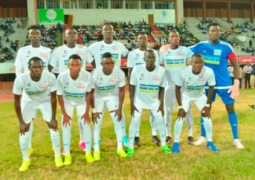Speaking at the commemoration marking the day at the TANGO Conference Hall in Kanifing, GPU president Bai Emil Touray said press freedom in The Gambia “is more or less non existent”.
“This is why we feel it as important for us to look at the draconian media laws that affect our fundamental rights as Gambians and residents of this country,” he said.
Under the global theme: “New Voices; Media Freedom Helping to Transform Societies”, the celebrations in The Gambia were organized by the GPU, FLARE and the International Centre for Journalists (ICFJ), brought together journalists and other stakeholders to reflect on the challenges confronting the media.
According to Touray, it is important to look at various media laws that exist in this country with a view to bringing them in line with parameters set by the UN human rights committee.
“A study carried out by Article 19 clearly indicated how some of these laws are at variance with both regional and sub-regional standards,” he added.
Citing section 25 of the 1997 Constitution, which states among others that every person has the right to free expression, Touray said democracy without free expression is meaningless, because as he put it, free expression is a fundamental pillar for any democracy.
“Many Gambians are afraid to speak their mind for fear of reprisals. We want the authorities to create the enabling environment that will be a basis for ordinary Gambians to partake in the democratization process of the country,” Touray added.
World Press Freedom Day, he went on, was set aside by the United Nations with a view to creating an enabling environment for journalists and media personnel to brainstorm on issues that affect their work, as well as remember matters of free expression.
This, he noted, is why the GPU deemed it prudent to commemorate the day with a view to remembering some of their fallen colleagues, namely the late Omar Barrow who was murdered in 2000, the late Deyda Hydara, who was also gunned down in 2004 and journalist Chief Ebrima Manneh, who disappeared in The Gambia since July 2006.
Touray
used the occasion to renew calls on the
To journalists, he said: “it is also important that, while we pray for free expression, we do our utmost to ensuring that we live up to expectations by adhering to the principles of the profession, and not engage in any conduct that is likely to cast doubt on our profession.”
He commended FLARE, ICFJ and others for their partnership with the Gambia Press Union.
Mr. Alieu Sagnia a Gambian journalist, in presenting a paper on “Media and Hate Speech”, said journalists should censure hate speech because it is a crime. Freedom of expression has boundaries, he went on, adding that one boundary is that making or publishing some kinds of threatening statement is a crime.
“It is an offence to stir up hatred against people because of their race, for example.”
Mr.
Sagnia cited the fact that in the
“Under the Public Order Act 1986 (UK), it is an offence for a person: to use e.g. in the street or in a public speech threatening, abusive or insulting words or behavior with intent to stir up racial hatred; or to display, publish, or distribute written material that is threatening, abusive, or insulting with intent to stir up racial hatred.
“Racial hatred is defined as being ‘hatred against a group of persons defined by reference to colour, race, nationality (including citizenship), or ethnic or national origins’.
“The fact that such an offence can be committed even without intent means that a media organization reporting with direct or indirect quotes an inflammatory speech or election manifesto (such as that of an extremist politician) or other expression of anti-immigrant propaganda could be prosecuted.
“The Attorney General has to consent to any prosecution, and in 1987 the then AG said that when making a decision on whether to allow any such prosecution of a newspaper he would probably take into account the nature of the publication, its circulation, and the market at which it was aimed, as well as any special sensitivity prevailing at the time of publication which might influence the effect on those who read the material.
“He warned that a newspaper which published an inflammatory racist letter from a reader would not necessarily escape prosecution merely by publishing, in the same edition, an editorial or letters expressing an anti-racist view.
“However, the law is more likely to be used against extremists than against mainstream media.
“In
“The crime occurs if a person uses threatening words or behavior, or displays, publishes, or distributes any written material which is threatening, if he/she intends thereby to stir up religious hatred.
“It is also an offence for a person to include threatening visual images or sounds in a broadcast programme if he/she intends thereby to stir up such hatred.
“The programme provider, producer, or director, or anyone using the words, could be convicted, if such person had such intent.
“Under this law, religious hatred is said to be hatred against a group of persons defined by their religious belief or lack of religious belief.
“In
“This hatred is defined as ‘hatred against a group of persons defined by reference to sexual orientation (whether towards persons of the same sex, the opposite sex or both)’.
“The law was meant to protect homosexual and bisexual people.
“This crime occurs if a person uses threatening words or behavior, or displays, publishes, or distributes any written material which is threatening, if he/she intends thereby to stir up such hatred. There is also a broadcasting offence of such stirring up.
“The Act states that discussion or criticism of sexual conduct or practices ‘or the urging of people to refrain from or modify such conduct or practices’ is not in itself, to be taken to be threatening or intended to stir up such hatred (i.e. deemed to be illegal).
“For such stirring up offences outlined above, a magistrate can grant police a warrant to seize inflammatory material.
“None of the offences applies to the publication of what is said in Parliamentary proceedings or to contemporaneous reports of court cases or of other judicial proceedings.
“The Attorney General has to approve all such prosecutions.
“Penalties for any of these offences are up to six months’ imprisonment or a fine or both on summary conviction, and up to seven years’ imprisonment or a fine or both on conviction on indictment”.
Mr.. Sagnia in his presentation pointed out that in The Gambia, the country’s laws provide for the offence of sedition and the offence of criminal libel.
“The publication of a ‘seditious libel’ is in law a criminal offence, whether published in writing or by word of mouth.
“It is no defence to prove that the words complained of are true, or that they form part of a fair and accurate report of what was said on a privileged occasion.
Read more on the celebrations in our Monday issue.



